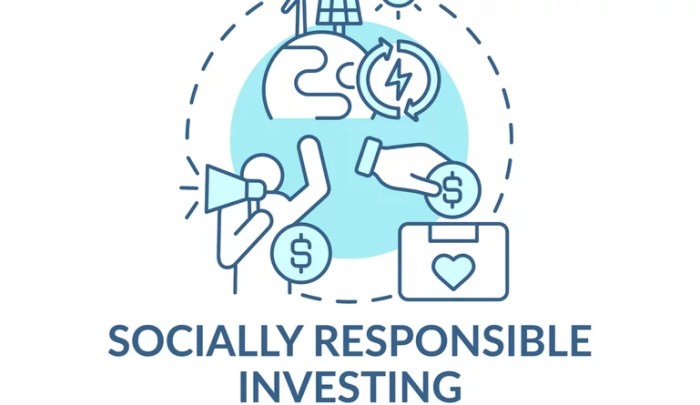Get ready to dive into the world of Socially responsible investing, where making money meets making a difference. Buckle up as we explore the ins and outs of this impactful investment strategy with a modern twist.
From defining the concept to understanding its benefits and strategies, this guide will equip you with all you need to know about Socially responsible investing.
Socially Responsible Investing
Socially responsible investing (SRI) is an investment strategy that considers both financial returns and social/environmental impact. Investors who practice SRI aim to support companies that align with their values and promote positive change in the world.
Key Principles of SRI
- Environmental Sustainability: Investing in companies that prioritize eco-friendly practices and sustainability.
- Social Justice: Supporting businesses that promote diversity, equality, and fair labor practices.
- Corporate Governance: Backing companies with transparent and ethical leadership.
Companies/Funds Practicing SRI
- Calvert Impact Capital: A fund that invests in projects focused on community development and sustainability.
- Patagonia: A company known for its environmental activism and commitment to sustainable business practices.
- Vanguard FTSE Social Index Fund: An investment fund that tracks the performance of socially responsible companies in the FTSE4Good Index.
Benefits of Socially Responsible Investing
Investing in a socially responsible manner has numerous advantages that go beyond just financial gains. By aligning your investments with your values and beliefs, you can make a positive impact on society while potentially earning competitive returns.
Financial Performance
- SRI investments have shown to be just as profitable, if not more, compared to traditional investments. Companies that prioritize environmental, social, and governance (ESG) factors tend to be more sustainable in the long run, leading to potential growth and stability.
- Research has indicated that SRI funds have the potential to outperform conventional funds over the long term, as they consider a broader range of risks and opportunities.
Alignment with Personal Values
- One of the key benefits of SRI is the ability to invest in companies that reflect your personal values and beliefs. This allows investors to support causes they care about, such as sustainability, social justice, or diversity.
- Investing in line with your values can provide a sense of fulfillment and purpose, knowing that your money is being used to create positive change in the world.
Strategies for Socially Responsible Investing
Socially Responsible Investing (SRI) involves various strategies to align investments with ethical and social values. Two common approaches within SRI are Environmental, Social, and Governance (ESG) integration and impact investing.
ESG Integration
ESG integration focuses on incorporating environmental, social, and governance factors into investment decisions. This approach evaluates companies based on their sustainability practices, diversity initiatives, and ethical leadership, among other criteria.
Impact Investing
Impact investing aims to generate positive social or environmental impact alongside financial returns. Investors actively seek out opportunities that address specific issues, such as climate change, poverty alleviation, or access to healthcare. These investments are intended to make a measurable difference in the world.
Factors to Consider in Selecting SRI Opportunities
- Alignment with Values: Ensure that the SRI opportunities align with your personal or organizational values and goals.
- Performance Track Record: Evaluate the historical performance of SRI options to gauge their financial stability and growth potential.
- Transparency and Disclosure: Look for investments that provide clear and transparent information about their impact and ESG practices.
- Risk Management: Assess the risks associated with SRI opportunities and determine if they align with your risk tolerance levels.
Maintaining Diversification in SRI Portfolios
Diversification is essential in SRI portfolios to mitigate risk and maximize returns. Investors can achieve diversification by investing in a mix of asset classes, sectors, and regions. This helps spread out risk and ensure that the portfolio remains resilient to market fluctuations.
Impact Measurement in Socially Responsible Investing

Investors in socially responsible investing (SRI) are increasingly interested in understanding and quantifying the impact of their investments beyond just financial returns. By measuring impact, investors can assess how their investments are contributing to positive social and environmental outcomes.
Metrics Used for Evaluating Impact
- Carbon footprint reduction: This metric measures the amount of greenhouse gas emissions avoided or reduced due to investments in clean energy or sustainable practices.
- Gender diversity: Evaluating the representation of women in leadership positions within companies in the investment portfolio.
- Community engagement: Assessing the level of community involvement and support provided by companies in the portfolio.
Challenges in Quantifying Impact
- Complexity of impact: Social and environmental impact can be multifaceted and interconnected, making it challenging to measure and quantify accurately.
- Lack of standardized metrics: There is a lack of universally accepted metrics for measuring impact, leading to inconsistencies in reporting and evaluation.
- Data availability: Limited availability of reliable and consistent data on social and environmental impact can hinder accurate measurement.
